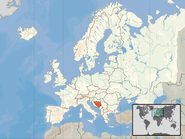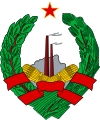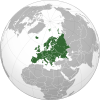Welcome to the Bosnia and Herzegovina Portal
 |
 |

| |
Bosnia and Herzegovina ( Serbo-Croatian: Bosna i Hercegovina, Босна и Херцеговина; sometimes known as Bosnia-Herzegovina and informally as Bosnia) is a country in Southeast Europe, situated on the Balkan Peninsula. It borders Serbia to the east, Montenegro to the southeast, and Croatia to the north and southwest. In the south it has a 20 kilometres (12 miles) long coast on the Adriatic Sea, with the town of Neum being its only access to the sea. Bosnia has a moderate continental climate with hot summers and cold, snowy winters. In the central and eastern regions, the geography is mountainous, in the northwest it is moderately hilly, and in the northeast it is predominantly flat. Herzegovina, the smaller, southern region, has a Mediterranean climate and is mostly mountainous. Sarajevo is the capital and the largest city.
The area has been inhabited since at least the Upper Paleolithic, but evidence suggests that during the Neolithic age, permanent human settlements were established, including those that belonged to the Butmir, Kakanj, and Vučedol cultures. After the arrival of the first Indo-Europeans, the area was populated by several Illyrian and Celtic civilizations. The ancestors of the South Slavic peoples that populate the area today arrived during the 6th through the 9th century. In the 12th century, the Banate of Bosnia was established; by the 14th century, this had evolved into the Kingdom of Bosnia. In the mid-15th century, it was annexed into the Ottoman Empire, under whose rule it remained until the late 19th century; the Ottomans brought Islam to the region. From the late 19th century until World War I, the country was annexed into the Austro-Hungarian monarchy. In the interwar period, Bosnia and Herzegovina was part of the Kingdom of Yugoslavia. After World War II, it was granted full republic status in the newly formed Socialist Federal Republic of Yugoslavia. In 1992, following the breakup of Yugoslavia, the republic proclaimed independence. This was followed by the Bosnian War, which lasted until late 1995 and ended with the signing of the Dayton Agreement.
The country is home to three main ethnic groups: Bosniaks are the largest group, Serbs the second-largest, and Croats the third-largest. Minorities include Jews, Roma, Albanians, Montenegrins, Ukrainians and Turks. Bosnia and Herzegovina has a bicameral legislature and a three-member presidency made up of one member from each of the three major ethnic groups. However, the central government's power is highly limited, as the country is largely decentralized. It comprises two autonomous entities—the Federation of Bosnia and Herzegovina and Republika Srpska—and a third unit, the Brčko District, which is governed by its own local government.
Bosnia and Herzegovina is a developing country and ranks 74th in the Human Development Index. Its economy is dominated by industry and agriculture, followed by tourism and the service sector. Tourism has increased significantly in recent years. The country has a social-security and universal-healthcare system, and primary and secondary level education is free. It is a member of the UN, the Organization for Security and Co-operation in Europe, the Council of Europe, the Partnership for Peace, and the Central European Free Trade Agreement; it is also a founding member of the Union for the Mediterranean, established in July 2008. Bosnia and Herzegovina is an EU candidate country and has also been a candidate for NATO membership since April 2010. ( Full article...)
Selected article -

Yugoslavia ( /ˌjuːɡoʊˈslɑːviə/; lit. 'Land of the South Slavs') was a country in Southeast and Central Europe that existed from 1918 to 1992.
It came into existence in 1918 following World War I, under the name of the Kingdom of Serbs, Croats and Slovenes from the merger of the Kingdom of Serbia with the provisional State of Slovenes, Croats and Serbs (which was formed from territories of the former Austria-Hungary), and constituted the first union of South Slavic peoples as a sovereign state, following centuries of foreign rule over the region under the Ottoman Empire and Austria-Hungary. Peter I of Serbia was its first sovereign. The kingdom gained international recognition on 13 July 1922 at the Conference of Ambassadors in Paris. The official name of the state was changed to Kingdom of Yugoslavia on 3 October 1929. ( Full article...)General images
More did you know
- ... that with Bosnia and Herzegovina–Holy See relations improving, Pope John Paul II came for a visit—and then police discovered 23 land mines planted in the area where he was to have been driven?
Cities
- Banja Luka
- Bihać
- Berkovići
- Bijeljina
- Bosanska Krupa
- Bosanski Petrovac
- Brčko
- Brod
- Bugojno
- Cajnice
- Cazin
- Derventa
- Doboj
- Donji Vakuf
- Dubica
- Foča
- Goražde
- Gornji Vakuf
- Gračanica
- Gradačac
- Gradiška
- Ilidža
- Istočno Sarajevo
- Jajce
- Jablanica
- Kakanj
- Kalesija
- Konjic
- Kotor Varoš
- Laktaši
- Livno
- Ljubuški
- Lukavac
- Modriča
- Mostar
- Nevesinje
- Neum
- Novi Grad
- Novi Travnik
- Olovo
- Petrovo
- Prijedor
- Prnjavor
- Sanski Most
- Sarajevo
- Srebrenik
- Srebrenica
- Teslić
- Tešanj
- Travnik
- Trebinje
- Tuzla
- Velika Kladuša
- Visoko
- Vitez
- Zavidovići
- Zenica
- Zvornik
- Živinice
- Žepče
Selected biography -
Dobroslav Jevđević ( Serbian Cyrillic: Доброслав Јевђевић, pronounced [dǒbroslaʋ jêʋdʑevitɕ]; 28 December 1895 – October 1962) was a Bosnian Serb politician and self-appointed Chetnik commander ( Serbo-Croatian Latin: vojvoda, војвода) in the Herzegovina region of the Axis-occupied Kingdom of Yugoslavia during World War II. He was a member of the interwar Chetnik Association and the Organisation of Yugoslav Nationalists, a Yugoslav National Party member of the National Assembly, and a leader of the opposition to King Alexander between 1929 and 1934. The following year, he became the propaganda chief for the Yugoslav government.
Following the Axis invasion of Yugoslavia in April 1941, he became a Chetnik leader in Herzegovina and joined the Chetnik movement of Draža Mihailović. Jevđević collaborated with the Italians and later the Germans in actions against the Yugoslav Partisans. Although Jevđević recognised the authority of Mihailović, who was aware of and approved of his collaboration with Axis forces, a number of factors effectively rendered him independent of Mihailović's command, except when he worked closely with Ilija Trifunović-Birčanin, Mihailović's designated commander in Dalmatia, Herzegovina, western Bosnia and southwestern Croatia. ( Full article...)Did you know (auto-generated)

- ... that a Socialist Youth League candidate in the 1990 Bosnian general election registered his ethnicity as ' Eskimo' as an apparent protest against ethnic registry requirements for candidates?
- ... that Ivan Ančić was the first Bosnian Franciscan to use the Latin script to write in his native language?
Subcategories
Related portals
Religions in Bosnia and Herzegovina
Ex-Yugoslav countries
Other countries
Topics
Recognized content
Things you can do

- Request images:
-
Request maps:
- Sarajevo city location map
-
Articles wanted:
- Clinical Center University of Sarajevo (Koševo hospital);
- Articles needing major work,
Be Bold!: **
- Architecture of Bosnia and Herzegovina
- Health in Bosnia and Herzegovina
- Literature of Bosnia and Herzegovina
- List of universities in Bosnia and Herzegovina
- Foreign relations of Bosnia and Herzegovina
- Cinema of Bosnia and Herzegovina
- Subpages of List of settlements in the Federation of Bosnia and Herzegovina
- Stubs needing expansion:
- Featured Portals:
- Featured Pictures:
- Articles with Featured Article Candidate's status within reach:
- Current Featured Candidates:
- Featured Articles: (Don't be too bold!)
- Current Good Article Candidates:
- Good Articles:
- Former Good Articles:
Web resources
- B&H Tourism - Official Web Site
- Tourism Association of the Federation of Bosnia and Herzegovina - Official Web Site
- Tourism Association of Republika Srpska - Official Web Site
- Duga-Tehna
Other links:
- Bosnian National Monument - Muslibegovica House
- "Bosnia and Herzegovina". The World Factbook (2024 ed.). Central Intelligence Agency.
- Bosnia & Herzegovina Economy
- Bosnia and Herzegovina Map
- Bosnia News
- rjecnik.ba English-Bosnian and German-Bosnian On-line Dictionary (in Bosnian, English, and German)
- The State of Media Freedom in Bosnia and Herzegovina: The Public Service Broadcasting Report by the OSCE Representative on Freedom of the Media
Associated Wikimedia
The following Wikimedia Foundation sister projects provide more on this subject:
-
Commons
Free media repository -
Wikibooks
Free textbooks and manuals -
Wikidata
Free knowledge base -
Wikinews
Free-content news -
Wikiquote
Collection of quotations -
Wikisource
Free-content library -
Wikiversity
Free learning tools -
Wikivoyage
Free travel guide -
Wiktionary
Dictionary and thesaurus













































































